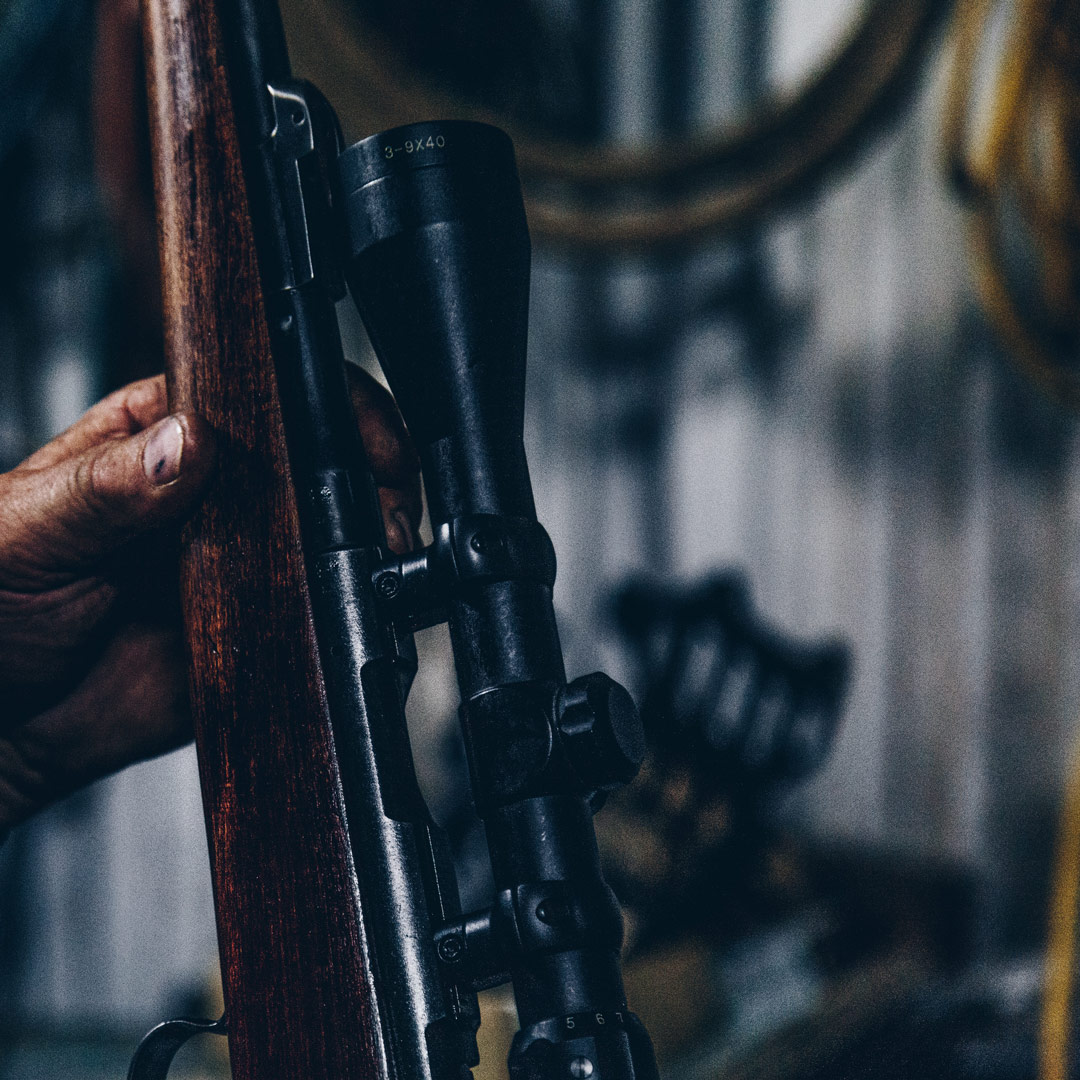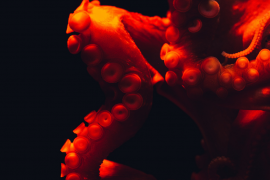EVERY DAY ON THE MOUNTAIN I AWAKEN TO FISH OR FORAGE, and every day at 4pm my walkie-talkie crackles with Uncle Mack’s voice ordering us down to target practice. Afternoons, I wander to the scrubby clearing beneath his house and help to reposition the bodies made of straw, old t-shirts, and duct tape—effigies of my cousin Melanie, her brother, my aunt. Mack paces behind us in shorts and colorful selections from his iconic t-shirt collection. Today’s shirt is stiff and bright black, likely never worn; the front commemorates a visit by the Dalai Lama to Penn State a decade ago. On the back, in slanted white letters, the shirt proclaims, “‘Never Give Up!’ – His Holiness the Dalai Lama,” with a big airbrushed portrait of the Dalai Lama, grinning. Something about the shirt hints at an amateur design—an unofficial vendor hawking wares outside the arena. The shirt may yet end up on one of the dummies. Three weeks ago he retired the baby blue one with the drawing of pedestrians staring into their cell phones, an orderly queue of them walking right off a cliff.
“Aren’t Buddhists pacifist vegetarians?” I ask, loading a rifle.
“You want to eat meat this winter?” Uncle Mack squints at me, hands on his trim waist. “Because freeze-dried food makes it really hard to shit. Fire that gun.”
I fire. The straw shimmies. “A deer, okay,” I say. “Maybe.”
“Deer, turkeys, rabbits, you name it.” He strolls away, toward the empty crates next to me, my cousin Melanie’s usual spot. Nobody else is here yet, but he sets out fresh ammo.
“Aren’t Buddhists pacifist vegetarians?” I ask, loading a rifle.
“Why aren’t we killing them now, then?” I ask. “Even though I don’t want to.” I line up my shot. When we talked about straw men back in college, I never pictured this. Only a few years ago, but might as well have been a century.
“If we start killing everything in midsummer, before the animals mature and breed, what protein will we have for winter?”
My shot strikes the shoulder. I stand up to reload, and look around. From the middle of the garden, Melanie waves. She is dragging a sprinkler which is plugged into my uncle’s solar unit. My cousin is a better shot than me. All those years I boycotted Thanksgiving because of politics and religion, while she practiced her riflery and hatchet toss. Uncle Mack steps over, adjusts my shoulders. “Whenever you pull a gun, you mean business. Shoot to kill is the rule, not the exception.”
“I’d rather shoot someone’s foot to scare him off.”
“So he can reach into his pocket and blow you away.” He points to where the drive dips below the tree line. I know what’s coming, but the repetition doesn’t seem to faze him. “You see there? That’s where they’ll come – mobs of them from the cities. They’ll roam for as long as they can find gas, and then they’ll walk. They’ll want our food. They’ll think we’re selfish because we saw the signs and prepared. You know what parents will do for starving kids?”
I stir a finger in the box of bullets. “Maybe we shouldn’t be selfish. Maybe we should give them some food, and you know,” I nod toward the imaginary hordes in the driveway, “suggest they move along.”
“My property, my way,” Uncle Mack says. He rubs his nose, laughs. “You don’t like it, you can leave.”
We move on to crossbows. I’m better with that—the heft and release of the bow feels more natural. Still haven’t killed anything with one, though. I worry about my usefulness as an orphan relation; within days of our bugging in at my uncle’s compound two months ago, a hierarchy quickly and quietly formed. None of what I studied of psychology in college mattered; I received crash courses in what went to the compost pile and what went to the goats, how to live with less electricity, how to dry and can what we gathered. The nuke that went off in the city had been a strategic one, the fallout here minimal; that alone has my uncle convinced the Deep State pulled a false flag.
“They need a war, a last grab for cheap energy,” he says at dinner. “The Arctic’s in serious meltdown, and a few nukes are all we’ve got to stall a massive methane burp. Either that or we need a volcano to erupt.”
I aim my bow and fill the straw man with arrows.
***
The next morning, behind the house, I fill the water trough for the goats while Uncle Mack climbs across the roof. He stops now and then to adjust a solar panel. A stone’s throw away, something rustles an evergreen bush—a rabbit sits up on his haunches, turns and scampers off. I’m still constipated from last night’s freeze-dried beef stroganoff. So much for my five solid years as a disciplined pescatarian. Even if I had a rifle with me I would have to be very quick, not to mention a great shot.
“Uncle Mack,” I call. “I want to learn how to set traps. Would you be able to show me?”
“You gotta set a lot of them, check them all the time.”
“Do I have anything else better to do?”
He swears at the solar panel he’s holding, stomps around up there. Cold water drenches my calves; the trough runs over. “You going to skin and butcher the game when you bring it back?” he yells, finally. “Pull out the guts? ‘Cause that’s what you have to do.”
I aim my bow and fill the straw man with arrows.
The billy goat comes up and rubs his head against my waist, his odor filling my nose and mouth. The goats stink but I love them anyway. “I’ll learn,” I say. “Maybe I’ll be good at it. Maybe I’ll be better with traps than guns.”
Indoors is cool, no A/C, from the house being built against the rock. On the far side of the living room, where someone else would keep a widescreen TV, books line the shelves floor to ceiling. Many are hardcover, gold-embossed classics, but the DVD cabinet contains worn softcovers: homesteading and survival manuals. He pulls out The Trapper’s Bible, Basic Butchering of Livestock and Game, How to Survive in the Woods, and a few others.
“For your stack,” he says, meaning the field and foraging guides he handed me weeks ago, to reinforce what he’d shown me in the woods.
The trees are still but the woods are not. Insects rasp and beat, birds flutter and chirp. I walk right through a cobweb and shake out my arms, unable to get the sticky feeling off me. Mack, up ahead, steps around the cobwebs, then resumes the path. A strand of blackberry bushes lines a rocky outcropping, most of the berries picked clean by Melanie and me, plus deer and bear, but a few remain. Lots of flat rock slabs around. Here Uncle Mack sets up our first primitive fall-trap. “Easy, huh?” he says. “You try.”
I find the appropriate sticks and rocks, and set up the trap. Only the rock drops, the stick snaps; my heart jolts. I get a new stick, reset the trap, and the rock falls again—scrapes my knuckles this time. “I don’t know if I can do this,” I say. “I need more than just to survive. I need joy, I need beauty.”
“You’re not enjoying this?” In the shade, Uncle Mack has set up two traps outside animal holes. “Put me in a zone, once I get going.”
“But what’s the point? To just ‘keep going’?”
“That’s the path of the warrior: to keep going, come out on the other side—whatever that is.” He strolls over, shuffles through his handful of sticks, resets my trap. “Don’t think so much.”
We follow a game trail up, then down, then up, setting ground snares with a spool of fishing line. “Easy, huh?” he says. Finished, he starts back but I tell him I’m going to hike farther up the ridge. The sky is a weird bright haze, the air moist and hot. A turtle shies at the edge of the trail; I pause, then hike past him. Only after I scramble over some boulders at the top do I wonder: should I have looked at him as food, or did I read something about turtle meat and parasites? I sit cross-legged, blood seeping from my scraped knuckle. Here you can see for miles, across the Delaware and the flat of New Jersey. The war will come here. There will be punishing drought. And we are bombing how many countries now? What they don’t tell you is you can live without hope. When you let go of that, fear dissolves as well. But then what — do I want to spend my days hunting and trapping? Am I capable of killing, even to defend myself? And then when does the killing end? A burrow remains beneath a nearby tree. I scoot over, set up a fall-trap.
“I need more than just to survive. I need joy, I need beauty.”
***
That night Uncle Mack hums over a pot of boiling pasta. I rinse tomatoes and shred what I have gathered from the yard—plantain, dandelion, lamb’s quarters—into bite-sized chunks. The lettuce turned sour weeks ago. “Weed salad,” he says, “just like Mom used to make.” He dumps a can of white beans into the sauce. I frown. I don’t care if I see pasta or beans for the rest of my life, but I keep this to myself. Truck deliveries have been intermittent; families are hungry.
The two of us sit at one end of the long dining table, the chandelier overhead dim. “You think we’ll have luck with those traps we set today?” I ask. I spear some beans and greens together, mix up the taste. “Or you think that was a waste of time?”
“Depends what walks under them,” he says. Sauce dribbles down his chin; he mops it up, staring ahead. “Depends if you used bait. Which we didn’t.” Darkness shrouds the front room of the house, his large telescope immobile, dull with dust. A birdcage sways empty among the feral houseplants. “If we’re lucky we’ll get a squirrel or a chipmunk.”
“Luck doesn’t sound too encouraging.”
“Just set more traps.” He picks out a dandelion stem, points the fluff at me. “Cast a wider net, literally.” The dandelion disappears into his mouth. He chews and swallows fast.
Beside me is the messy stack of books we pulled from his library earlier. I pull over The Trapper’s Bible and leaf through it. “Fish traps, now those are interesting. I’d love to go fishing tomorrow.” I eat the rest of my salad, except for the dandelion. The yellow heads pile up at the bottom. “Do you enjoy this, Uncle Mack? Is living like this enough for you?”
“Enjoy?” He frowns. “How do you think we lived before we sold out for trinkets and junk? Set some traps, fished, fucked. Made war on each other with stones and sticks.” His nostrils flare. From the hillside behind us comes the faint cry of the youngest goat. “Poisoned and radiated the whole goddamn place.”
Silence beats. “I enjoyed myself today,” I say quietly. “Thanks.”
He rises, gathers the plates. “You want to go fishing, look up some traps. If kids in Bolivia can make them, so can you.”
Some of the books still smell unused: sleek field guides, the photos vivid and bright. Some, like The Trapper’s Bible, are underlined, notes scrawled in the margins from a previous owner. “For possible use on the Six Mile trail?” crawls up the side in neat, antiquated cursive, with an arrow pointing to the trap illustration. The Foxfire books contain old stories and anecdotes, along with old black-and-white shots of Appalachia—bearded, wiry men and sour-faced women. One man holds up a rattlesnake that matches his height. Other photos depict the steps to build a log cabin, and how to make lye for soap. I find no shortage of traps; the more sophisticated require twine to bend and tie saplings, a hatchet to make notches in wood. All evolved from centuries of trial and error, as organic as the humus of the forest floor, and in the last century, just abandoned. Traps have a sense of fair play aligned with the universe. Be aware and avoid, be unaware and get caught. If caught you might escape, but not without injury. In the woods and marshes, death feeds life. A truth so obvious we have forgotten.
“Enjoy?” He frowns. “How do you think we lived before we sold out for trinkets and junk? Set some traps, fished, fucked. Made war on each other with stones and sticks.”
***
Aweek, maybe two, goes by. The days blur. We build and set the traps where the waterfall meets the creek, but the fish are very small. We have better luck with the snares: squirrels, rabbits, and once, a small fawn, delicate and beautiful. He wriggles fiercely and I cut the line; a second later there is nothing of the creature, nothing but a crash in the brush and he is gone. The cardinal that lives above flies to and fro, watching me.
One day we’re in the clearing, the shooting range dummies soggy and losing their straw after a few thunderstorms. Under a tree Uncle Mack skins a rabbit that was caught in the morning’s snare. Blood and entrails moisten the dirt, the odor metallic and earthy all at once. Clouds pass overhead; the blades glint. “Do you hear something?” I ask.
A breeze swirls the boughs above the driveway, but the crest where the gravel disappears from view remains empty. We freeze. “I hear shuffling,” I say. Our relatives who live nearby all have walkie-talkies; no visits happen unannounced.
Uncle Mack drops his knife and grabs his rifle. He puts a finger to his lips. A bomb struck Hawaii last week; all over the country, cities are emptying out. I grab my rifle and we creep down the driveway. Uncle Mack whips his walkie-talkie off his waist, radios his brother. A gang would have to pass the houses of my relatives first, all of whom are heavily armed. We would have heard gunshots from down the hill.
No one answers Uncle Mack. He fires a warning shot; birds screech and scatter.
“Hold on,” I say. “Unless some gang is invading with karate and knives, I doubt anything’s happened.”
“You heard of silencers?” He ducks behind a tree. We are close to where the driveway dips and curves now. He aims, finger on trigger.
A girl staggers up the hill, hair mussed and grimy, the loose remains of French braids. She shoulders a backpack, pauses to bend over and catch her breath. It’s my sister. No one’s heard from her since the last election.
“Put that down, Uncle Mack,” I say. “It’s Cara.”
“Hi,” she pants, lunging up the remainder of the hill. “You look like you’ve been killing something.”
“I have,” I say. “You walked here? From Massachusetts?”
“Sure did.” She slings off her backpack, her stale body stench more pungent than the rabbit. She tells us how she remembered what Uncle Mack said a long time ago, about the Appalachian Trail running along the next ridge from our relatives’ cluster of properties. “Thanks for not shooting me,” she says to him.
“You armed?” He lowers his rifle. Today he wears a faded polo shirt with the logo of a local pizzeria long defunct. “Trail’s got to be dangerous right now.”
“Actually, no.” Cara describes how she traveled mostly with a group of med school students who had caught the trail in Western Massachusetts, same as she did. They’d helped each other out: shared food, carried each other’s belongings when someone got too tired, built fires, sang songs. That she couldn’t have made the journey alone. They had parted ways near Wind Gap; some had family they wanted to meet up with in New Jersey and farther south. She didn’t believe she’d see any of them again.
Our uncle waved toward the house. “Come on up, shower. We’ll be firing up the grill soon. Looks like you need some protein.”
Cara and I hug. “I wish you’d brought your friends,” I say. “I’m sorry.”
“Zombie hordes,” she says, and laughs into my shoulder. I slip on her backpack and rest my rifle under the tree. An owl gracefully sails over our path and the clearing, a dark form limp in his claws.
Vanessa Blakeslee’s writing has appeared in The Southern Review, Green Mountains Review, The Paris Review Daily, Kenyon Review Online, and elsewhere. Her novel Juventud won the 2015 IPPY Bronze Medal in Literary Fiction, was a finalist for Foreword Review’s Book of the Year, and a runner-up for the Eric Hoffer Award. Her debut story collection Train Shots won the 2014 IPPY Gold Medal in Short Fiction.
“Traps” is the opening story of her new collection, Perfect Conditions, forthcoming July, 2018 from Curbside Splendor.
More about Perfect Conditions — Everyone here is both at home and lost: a deep sea fisherman discovers he may not be allowed to return to shore; a newlywed couple embark on a disastrous honeymoon; a niece and uncle debate the ethics of hunting after a nuclear fallout; a surfer struggles between cross-continental commitments and local attractions; and a single mother begins preparations for the end of the world as we know it. From the unforgiving surf of Costa Rica to suburban Florida, the stories in Perfect Conditions arise within worlds we know and others that only resemble our own. Blakeslee’s characters often struggle to find control in unrelenting circumstances, in places which are often anything but welcoming.
Like what you’re reading? Get new stories sent to your inbox every Monday.
Drop your email below to start >>>




